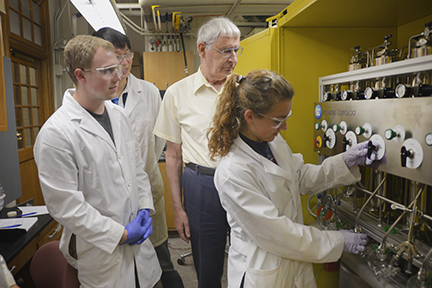About the Hagler Institute
The Hagler Institute for Advanced Study at Texas A&M University (formerly the Texas A&M University Institute for Advanced Study) provides a catalyst to enrich the intellectual climate and educational experiences at Texas A&M.

It is a mechanism for attracting world-class talent to the university and is driven by nominations of National Academy and Nobel-prize caliber researchers that align with existing strengths and ambitions of the university.
Each year the Hagler Institute invites a number of nationally and internationally prominent scholars to pursue advanced study at the Hagler Institute in collaboration with faculty and students at Texas A&M. The goal is to provide a stellar environment for research and scholarship with the Hagler Fellows having freedom to pursue their own research interests, as well as collaborate in disciplinary and multidisciplinary research. Each Hagler Fellow affiliates with one or more of the doctoral degree granting academic departments housed in 16 colleges and schools. Additional resources provide Texas A&M fellowships for graduate students, as well as fund visiting graduate students and post-doctoral researchers affiliated with the Hagler Fellows.
The goal is to provide a stellar environment for research and scholarship with the Hagler Fellows having freedom to pursue their own research interests.
The Institute aims to enrich the educational experience and advance research productivity at Texas A&M University by fostering collaboration between A&M’s outstanding faculty and students with prestigious scholars from around the world. These scholars, who are on campus for up to a year, deepen A&M’s intellectual climate and add to A&M’s multidisciplinary efforts to solve some of mankind’s most difficult problems.
The Texas A&M University System Board of Regents established the Institute in December 2010; see A&M System Board of Regents Minute Order, p. 19. The Institute serves all fields of study on the A&M campus, including, but not limited to: medicine; science; architecture; social sciences; business; education; engineering; agriculture; veterinary medicine; law; and public and foreign policy.
